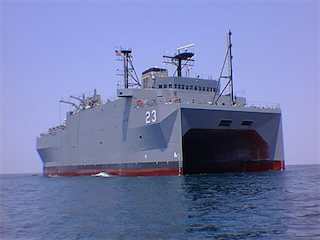Throughout the spring, China has been actively complaining about the presence of the USNS Impeccable off its coast (see earlier AEInews coverage). This week, the “Bejing Review,” an English-language weekly, ran a story on the controversy, playing the environmental card in its efforts to reach in international audience, though some of its examples confused mid-frequency sonar-related strandings with the LFAS system, which has not been associated with any known strandings (though monitoring is nearly impossible, given its very long range), and falsely claims that sonar training was banned off the California Coast and that the Navy discontinued sonar training off Hawaii. The story reports that a humpback whale was found stranded near Hong Kong “not long after” the Impeccable had been driven away, though no details are included about any investigation into the causes of the stranding.
The Impeccable is one of the US’s two ships equipped with Low Frequency Active Sonar (LFAS), both of which are deployed in the western Pacific to monitor
Chinese and North Korean submarines. In addition to harassing the Impeccable (which both emits LFAS signals and receives echoes on its SURTASS towed array of hydrophones), Chinese Navy and fishermen have dogged the USNS Victorious, one of several other US ships that can receive LFAS echoes on their own SURTASS arrays.

USNS Impeccable
China maintains that US warships must receive permission to travel in China’s Exclusive Economic Zone (EEZ), which extends 200 miles offshore; the US holds that international law only prohibits their activity in territorial waters 12 miles of the coast. Chinese arguments rest on the idea that free travel through the EEZ is limited to “innocent passage,” which would not apply to military vessels, though according to press reports, this interpretation is not generally accepted in global governance circles.
For some background on the SURTASS program and ships, see this page from the Federation of American Scientists (which formed in 1945 by Manhattan Project scientists to “provide timely, nonpartisan technical analysis on complex global issues that hinge on science and technology.” (I cannot vouch for their reputation; this page is also rather old). The US Navy offers these brief pages on the SURTASS ships. And, Wikipedia has a fairly well documented article on the Impeccable.
